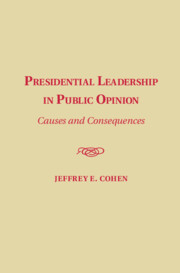Book contents
- Frontmatter
- Contents
- Figures
- Tables
- Acknowledgments
- 1 The Many Meanings of Presidential Leadership
- 2 Evidence of the Public Demand for Presidential Leadership
- 3 Congressional Sources of the President's Leadership Image
- 4 Success in Congress and Perceptions of Presidential Strength
- 5 Presidential Representation and Public Opinion
- 6 Presidential Leadership and Presidential Elections
- 7 Perceptions of Presidential Leadership, Trust in Government, and Attitudes toward Congress
- 8 Presidential Leadership, Public Opinion, and American Democracy
- Sources
- Index
1 - The Many Meanings of Presidential Leadership
Published online by Cambridge University Press: 05 May 2015
- Frontmatter
- Contents
- Figures
- Tables
- Acknowledgments
- 1 The Many Meanings of Presidential Leadership
- 2 Evidence of the Public Demand for Presidential Leadership
- 3 Congressional Sources of the President's Leadership Image
- 4 Success in Congress and Perceptions of Presidential Strength
- 5 Presidential Representation and Public Opinion
- 6 Presidential Leadership and Presidential Elections
- 7 Perceptions of Presidential Leadership, Trust in Government, and Attitudes toward Congress
- 8 Presidential Leadership, Public Opinion, and American Democracy
- Sources
- Index
Summary
THE UBIQUITY OF PRESIDENTIAL LEADERSHIP IN AMERICAN POLITICS
Leadership is an important standard by which presidents and presidential candidates are judged. For example, one voter had this to say about trying to decide whom to vote for in the 2012 presidential election: “What I look for in a candidate … Mostly, I want someone that I trust as a leader” (Appelbaum, March 17, 2012). Richard Wirthlin, who has conducted polls and provided advise for Republican presidential candidates, once asserted that “the single most important value of the American public is respect for strong presidential leadership” (Moore 1995, p. 205).
Candidates for the office recognize the importance of leadership to voters in selecting a president. The competing candidates routinely try to convince voters that they will do a better job of providing leadership than their opponent. A major theme of the challengers is that the incumbent does not provide strong leadership, that the incumbent is weak, and that they, the challengers, will do a better job of leading. For instance, during the 2012 presidential election campaign, Mitt Romney, the Republican nominee, continually criticized President Obama for his “appalling lack of leadership” (Memmott, April 4, 2012). On October 22, 2012, during the nationally televised presidential debate in Boca Raton, Florida, Romney stated that “what we need to do with respect to the Middle East is strong, steady leadership, not wrong and reckless leadership that is all over the map.” Although it may be uncomfortable for candidates to tout their leadership qualities, as opposed to attacking their opponents, their allies are often not so reticent in extolling those traits. Romney's vice presidential running mate, Paul Ryan, at the vice presidential debate with Joseph Biden, illustrated Romney's ability to work with others and overcome the high level of partisanship in current politics by pointing to Romney's stint as governor. “Mitt Romney was governor of Massachusetts, where 87 percent of the legislators he served, which were Democrats.
- Type
- Chapter
- Information
- Presidential Leadership in Public OpinionCauses and Consequences, pp. 1 - 23Publisher: Cambridge University PressPrint publication year: 2015

